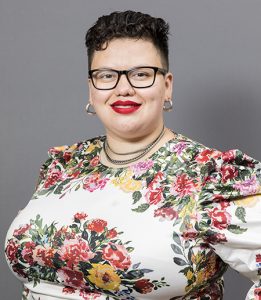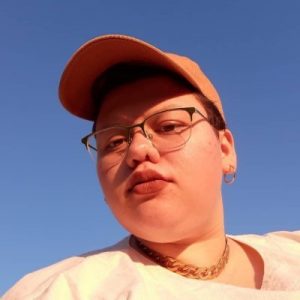Alum Spotlight: An Interview with Ariel Estrella ’15
Contact
The Words: Macalester's English Student NewsletterSenior Newsletter Editors:
Birdie Keller '25
Callisto Martinez '26
Jizelle Villegas '26
Associate Newsletter Editors:
Ahlaam Abdulwali '25
Sarah Tachau '27
Ash Ma ’21

Last semester, on Nov. 22, 2019, Mac English alum Ariel Estrella ’15 (they/them/theirs) joined the English department for a talk in the 4th-floor lounge of Old Main. They are currently enrolled in Cornell University’s English MA/Ph.D program, so they have a substantial amount of experience in applying to grad school and humanities jobs. Their words were full of support and love, which helped students of color to bravely think about post-graduate possibilities in academia. I was inspired by their encouragement, so I followed up with Ariel via email interview to further learn from their stories. Their reply offered earnest guidance to us undergraduate students.
Q: Where have you worked, or what projects have you worked on since graduation? What are the spirits/motivations of these experiences?
A: I had a week off between graduation and my entry into what would be four years of nonprofit work in labor and community-based arts organizations in New York City. I definitely recommend taking more of a break (at least a week!) if you can after graduation; I just needed the money right away as we live in, you know, [a] capitalist society and I needed to help support my family. But I was lucky to make sure the work I was doing was fulfilling, to myself and to my communities.
Right now, I am currently pursuing a doctoral English degree at Cornell University with a focus on queer of color lyricism. To guide myself, I ask: what does lyricism offer queer creators of color in the midst of racism and cultural celebration; homophobia and queer kinship; trans-phobia and gender possibility? And, in turn, what do queer creators of color offer lyrical creative enterprises with their experiments in form? In addition to my research, I explore these questions through my own creative projects, including anthology contributions and zines. My portfolio offers readers lyrical pieces that combine personal essays, poetry, and scholarly critique. My research and writing represent my need to envision new ways of being in the world alongside fellow queer creators of color.
Q: How did your education at Mac help you pursue your goal/job? What class(es), professor(s) were most formative for you during your time as a student?
A: I had a fellow ’15 alumnus tell me once that I could have made it anywhere, at any school I went to: it’s what you make of your education that determines your success. I want to believe I could have made it wherever I went, because that is important for me to recognize as a first-gen, working-class raised person of color. At the same time, there was something I feel is special about my time at Macalester. Mac offered such a particular gathering of resources, people, classes, and challenges that shaped the direction of my growth. I was a part of so many beautiful communities (including Bonner, the Mellon Mays Undergraduate Fellowship, many GSRC orgs, and The Mac Weekly), and I formed such a beloved community of support around me with my friends. I also would not be who I am today, nor specifically where I am today, without my mentors, Professors Daylanne English, Sonita Sarker, and Terry Krier, and literally everyone connected to the DML and CEC.
Q: What have been some of the challenges and rewards of your post-graduation life?
A: As a survivor of violence, my journey through recovery has been up and down. I began my healing process at Macalester through my service around self-love and violence prevention, and I thought that the confidence that I had my last semester as a senior would carry over forward forever. But what I have realized since is the extent to which my mental health dominated every facet of my life. You also pick up really awful habits at Macalester to just finish your work no matter the cost, which I learned the hard way was not an expectation anyone else had of me in the workplace or at home. So at Mac and immediately post-graduation, I was getting by, but not building a sustainable way of life. I have since started to pursue the kind of care I’ve always needed as a survivor and as a person living in an unjust, complicated world. This process has been so rewarding, has brought me so close to my friends and family, and has helped me get ready to be back in the academic space. One reward of this growth is that I am ready to help give a platform to others on their own journeys: I am currently editing an anthology on trans, two-spirit, and non-binary recovery with an emphasis on mental health, survivors of violence, transition, and addiction.
Q: What are some things you wish you had done earlier/better while you were still in college?
A: Raise even more of a stink about white supremacy and classism. (I mean, don’t get me wrong: I raised hell, but! there was certainly room for improvement.)
Q: Do you have any advice for current English majors or minors?
A: Another piece of advice that was handed to me: you are ready to publish now. Yes, now. Yes, whether or not you are on the creative writing track. Look up calls for submissions (such as the one hosted by Lambda Literary). Find a lit magazine that might vibe with your work (Review Review literally reviews lit mags). Join Facebook groups (I am a part of several identity-based writers caucuses). Recruit funding for or invest in your entry into a cool, hopefully, local/low-cost writing conference (I literally planned my vacations after Mac around AWP). Ask your professors and friends how to start up. It’s really as simple as starting to send your work out there. Maybe you will get rejected, maybe you won’t! You are ready now.

Q: What’s your favorite Mac/English department memory?
A: Being able to revise my papers from Daylanne’s classes, even if I got an A, and seeing how improved they were with her guidance.
Thank you, Ariel. Thank you for being you and enlightening fellow Mac students!
Ariel really focuses their advocacy on fostering POC and queer communities. They observe a need for marginalized peoples in the competitive college life. More importantly, they answer the call for support and extend a helping hand to those who are in need. Visit their website to explore more about their stories!